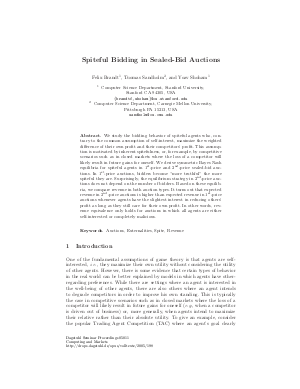Spiteful Bidding in Sealed-Bid Auctions
Authors Felix Brandt, Tuomas Sandholm, Yoav Shoham
-
Part of:
Volume:
Dagstuhl Seminar Proceedings, Volume 5011
Part of: Series: Dagstuhl Seminar Proceedings (DagSemProc) - License:
 Creative Commons Attribution 4.0 International license
Creative Commons Attribution 4.0 International license
- Publication Date: 2005-07-19
File

PDF
DagSemProc.05011.17.pdf
- Filesize: 196 kB
- 16 pages
Document Identifiers
Subject Classification
Keywords
- Auctions
- Externalities
- Spite
- Revenue
Metrics
- Access Statistics
-
Total Accesses (updated on a weekly basis)
0Document
0Metadata
Abstract
We study the bidding behavior of spiteful agents who, contrary to the common assumption of self-interest, maximize the weighted difference of their own profit and their competitors' profit. This assumption is motivated by inherent spitefulness, or, for example, by competitive scenarios such as in closed markets where the loss of a competitor will likely result in future gains for oneself. We derive symmetric Bayes Nash equilibria for spiteful agents in first-price and second-price sealed-bid auctions. In first-price auctions, bidders become "more truthful" the more spiteful they are. Surprisingly, the equilibrium strategy in second-price auctions does not depend on the number of bidders. Based on these equilibria, we compare revenue in both auction types. It turns out that expected revenue in second-price auctions is higher than expected revenue in first-price auctions whenever agents have the slightest interest in reducing others' profit as long as they still care for their own profit. In other words, revenue equivalence only holds for auctions in which all agents are either self-interested or completely malicious.
Cite As Get BibTex
Felix Brandt, Tuomas Sandholm, and Yoav Shoham. Spiteful Bidding in Sealed-Bid Auctions. In Computing and Markets. Dagstuhl Seminar Proceedings, Volume 5011, pp. 1-16, Schloss Dagstuhl – Leibniz-Zentrum für Informatik (2005)
https://doi.org/10.4230/DagSemProc.05011.17
BibTex
@InProceedings{brandt_et_al:DagSemProc.05011.17,
author = {Brandt, Felix and Sandholm, Tuomas and Shoham, Yoav},
title = {{Spiteful Bidding in Sealed-Bid Auctions}},
booktitle = {Computing and Markets},
pages = {1--16},
series = {Dagstuhl Seminar Proceedings (DagSemProc)},
ISSN = {1862-4405},
year = {2005},
volume = {5011},
editor = {Daniel Lehmann and Rudolf M\"{u}ller and Tuomas Sandholm},
publisher = {Schloss Dagstuhl -- Leibniz-Zentrum f{\"u}r Informatik},
address = {Dagstuhl, Germany},
URL = {https://drops.dagstuhl.de/entities/document/10.4230/DagSemProc.05011.17},
URN = {urn:nbn:de:0030-drops-1987},
doi = {10.4230/DagSemProc.05011.17},
annote = {Keywords: Auctions , Externalities , Spite , Revenue}
}
